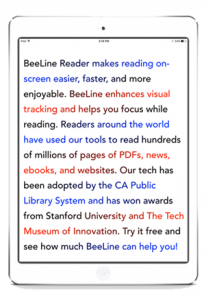 By: Nick Lum, CEO of Beeline Reader
By: Nick Lum, CEO of Beeline Reader
The transition from printed media to digital screens has opened the door to many new accessibility tools. Instead of just large-print books, new assistive technologies offer incredible customization and a wider range of benefits.
One new approach, created by my startup BeeLine Reader, is a tool that enhances visual tracking by using color gradients instead of plain black text. BeeLine  Reader has become very popular in the dyslexia and low-vision communities, where visual tracking is a common impediment to reading fluency and enjoyment. This tool is also widely used in the ADHD community, due to its ability to enhance focus. It has been studied and subsequently adopted by accessibility nonprofit Bookshare and is used in classrooms and homes around the world.
Reader has become very popular in the dyslexia and low-vision communities, where visual tracking is a common impediment to reading fluency and enjoyment. This tool is also widely used in the ADHD community, due to its ability to enhance focus. It has been studied and subsequently adopted by accessibility nonprofit Bookshare and is used in classrooms and homes around the world.
Technologies like this are not only helping people in the accessibility community read more easily— they are also helping change the perception of accessibility and universal design. Because BeeLine Reader is used widely by skilled/unimpaired readers (as a speed-reading tool), it is exposing people to the notion that by embracing universal design principles we can make life better for all people.
Today, we are excited to announce a new program, through which any device lending library or independent living center can get free access to our tools. These tools can be used to read news websites, PDFs, email, and even Kindle books.  They are available on iPads, Chromebooks, computers, and Android devices. To find out more or to verify your organization’s eligibility, just email [email protected]
They are available on iPads, Chromebooks, computers, and Android devices. To find out more or to verify your organization’s eligibility, just email [email protected]
To learn more about BeeLine Reader you can read about us in The Atlantic, listen to us on Public Radio, or watch this video from The Tech Awards 2015.




